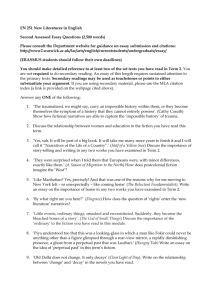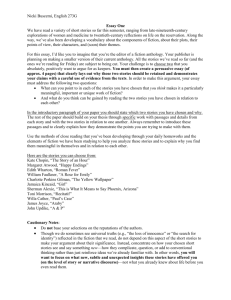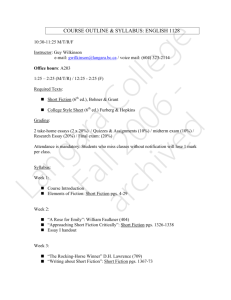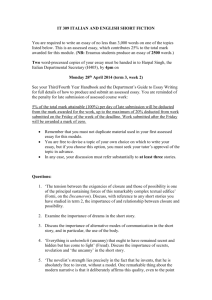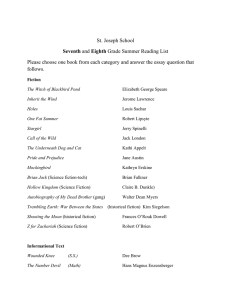New Lits Essay 2
advertisement
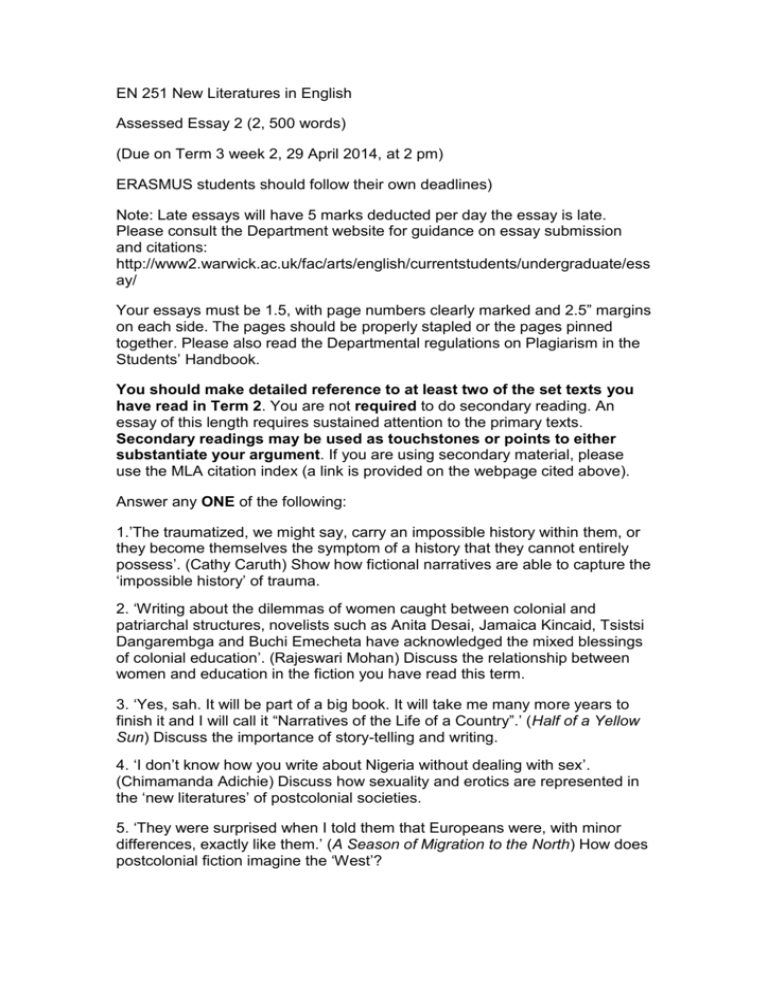
EN 251 New Literatures in English Assessed Essay 2 (2, 500 words) (Due on Term 3 week 2, 29 April 2014, at 2 pm) ERASMUS students should follow their own deadlines) Note: Late essays will have 5 marks deducted per day the essay is late. Please consult the Department website for guidance on essay submission and citations: http://www2.warwick.ac.uk/fac/arts/english/currentstudents/undergraduate/ess ay/ Your essays must be 1.5, with page numbers clearly marked and 2.5” margins on each side. The pages should be properly stapled or the pages pinned together. Please also read the Departmental regulations on Plagiarism in the Students’ Handbook. You should make detailed reference to at least two of the set texts you have read in Term 2. You are not required to do secondary reading. An essay of this length requires sustained attention to the primary texts. Secondary readings may be used as touchstones or points to either substantiate your argument. If you are using secondary material, please use the MLA citation index (a link is provided on the webpage cited above). Answer any ONE of the following: 1.’The traumatized, we might say, carry an impossible history within them, or they become themselves the symptom of a history that they cannot entirely possess’. (Cathy Caruth) Show how fictional narratives are able to capture the ‘impossible history’ of trauma. 2. ‘Writing about the dilemmas of women caught between colonial and patriarchal structures, novelists such as Anita Desai, Jamaica Kincaid, Tsistsi Dangarembga and Buchi Emecheta have acknowledged the mixed blessings of colonial education’. (Rajeswari Mohan) Discuss the relationship between women and education in the fiction you have read this term. 3. ‘Yes, sah. It will be part of a big book. It will take me many more years to finish it and I will call it “Narratives of the Life of a Country”.’ (Half of a Yellow Sun) Discuss the importance of story-telling and writing. 4. ‘I don’t know how you write about Nigeria without dealing with sex’. (Chimamanda Adichie) Discuss how sexuality and erotics are represented in the ‘new literatures’ of postcolonial societies. 5. ‘They were surprised when I told them that Europeans were, with minor differences, exactly like them.’ (A Season of Migration to the North) How does postcolonial fiction imagine the ‘West’? 6. “Like Manhattan? Yes, precisely! And that was one of the reasons why for me moving to New York felt – so unexpectedly – like coming home”. (The Reluctant Fundamentalist). Write an essay on the importance of home. 7.‘A novel that explored and dramatized the inner lives of characters caught up in a historical development of underdevelopment’. (Ngugi Wa Thiongo on Petals of Blood) How in ‘underdevelopment’ represented in the fiction you have read this term. 8. ‘By what right are you here?” (Disgrace) How do the question of ‘rights’ enter the ‘new literature’ narratives? 9.’They dazzle me with the tonnage of cotton or coca that has been exported, the acreage that has been planted with olive trees or grapevines. I am talking about natural economies that have been disrupted’. (Aime Cesaire) Analyse the representation of the environment in fiction. 10. ‘Little events, ordinary things, smashed and reconstituted. Suddenly, they become the bleached bones of a story’. (The God of Small Things) Discuss the importance of the ‘ordinary’ to the fiction you have read in this module.
